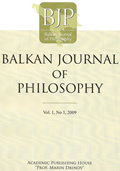Non-public and Public Reasons: Rawls’ “proviso”, Habermas’ “translation” and the Issue of Cultural Rights
Non-public and Public Reasons: Rawls’ “proviso”, Habermas’ “translation” and the Issue of Cultural Rights
Author(s): Plamen MakarievSubject(s): Philosophy
Published by: Институт по философия и социология при БАН
Summary/Abstract: More concretely, my purpose is to point out certain philosophical debates which can provide, in my opinion, theoretical “instruments” that might help reconceptualize the possibilities for communication between the nonpublic and the public domains. I mean first of all, but not only, the theories of political liberalism and deliberative democracy as well as the differentiation between “substantivist” and “procedural” kinds of discourse. The aim of this paper is to explore the split between two kinds of reasoning – non-public (culturally dependent) and public (characteristic for the procedures of policy design and, more generally, of taking generally binding decisions within the institutions of power). A largely acknowledged problem is that attempts to influence the public policies from the positions of cultural communities cannot be rationally substantiated because the arguments used are in most cases not recognized as valid by the general public, which does not share the particular beliefs and assumptions that guide reasoning in a contextually “embedded” cultural environment. This “barrier” between non-public and public reasoning is hindering the progress of recognizing minority rights and allowing the input of religiously inspired ideas into public life, to say the least.
Journal: Balkan Journal of Philosophy
- Issue Year: IV/2012
- Issue No: 1
- Page Range: 31-38
- Page Count: 8
- Language: English

